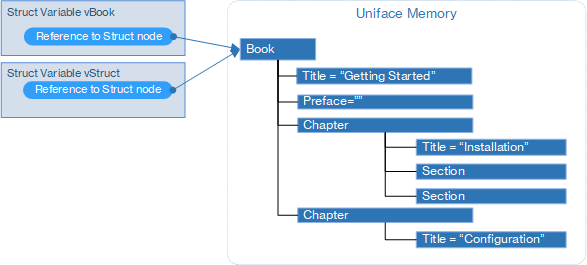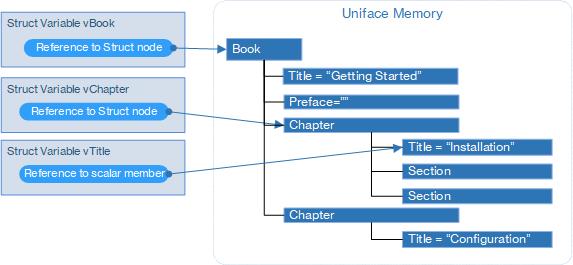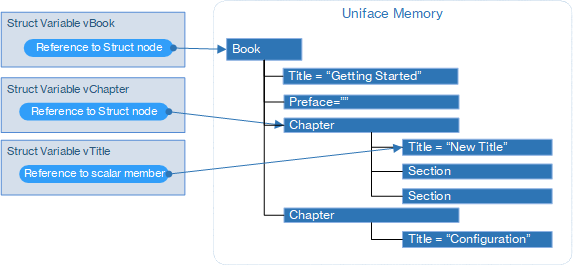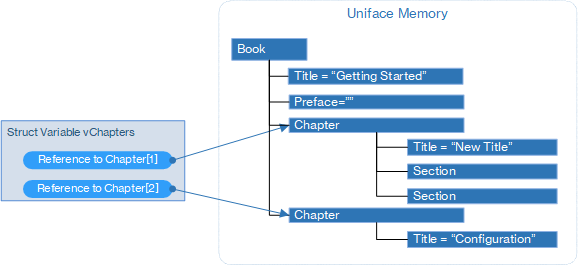Struct Variables
A Struct variable is a variable, parameter, or non-database field of type struct that holds an ordered collection of references to zero or more Structs or Struct members.
Struct variables are similar to handles in that both struct and handle are reference data types that cannot hold a value. Instead they hold references to data in memory. This is in contrast to scalar variables, which hold a value.
Unlike a handle, which can only hold one reference, a struct variable holds a collection of references.
The nature of the struct data type has a number of consequences when accessing a Struct:
- Several struct variables can
refer to the same Struct. For example:
variables struct vStruct, vBook, vChapter, vTitle endvariables ; Convert an XML document to a Struct xmlToStruct vBook, "file://book.xml" vStruct = vBook
Different Struct Variables Referencing the Same Struct

- A struct variable can refer
to a member of a Struct. Access operators enable you specify the member.
vChapter = vBook->chapter{1} ; Struct index operator vTitle = vChapter->Title ; Struct de-reference operatorvChapternow refers to the first member named chapter in the Struct referenced byvBook, andvTitlerefers to the title of that chapter. The chapter member is a nested Struct, whereas the title member is a scalar member.Struct Variables Referencing Members of a Struct
All these variables point to the same Struct in memory.
- A change made through one
struct variable, is reflected in other variables that refer to the same Struct
or Struct member. For example, changing the title of the first chapter (
vChapter):vChapter->Title = "New Title"
means that the following expressions all evaluate to
"New Title".$1 = vTitle $2 = vChapter->Title $3 = vBook->chapter{1}->Title ; $1 == $2 == $3 = "New Title"Changes Made to Struct Are Visible to All Variables That Point To It
- A single Struct variable can refer to multiple
Structs, which makes it possible to manipulate a group of Structs, instead of handling them
individually. For example, each
chaptermember of thevBookis itself a nested Struct. The following code results invStructcontaining a collection of Structs namedchapter:vChapters = vBook->chapter
One Struct Variable Referencing Several Structs
- A struct variable that
contains a collection of only one reference to a Struct node can be handled as a single Struct
rather than a collection. This means, for example, that you do not have to specify an index when
accessing it. For example, there is only one Preface member in a book Struct, so you can use:
vBook->preface
instead of using the Struct index operator to specify a particular reference in the collection:
vStruct{1} - A struct variable can refer to zero Structs. In this case, the collection size ($collsize) is 0.
- A struct variable or expression whose value is NULL is interpreted as being a collection of references to zero Structs. For more information, see Null Values.
- The term struct variables also encompasses struct parameters and non-database fields. For more information, see Passing Struct Parameters.
- ProcScript variables and parameters of type
any can also be used to refer to Structs, because Uniface implicitly converts
the data type.
variables any vAny struct vStruct endvariables vStruct = $newstruct ; Create a Struct vStruct->title = "Installation Guide" ; Add a member vAny = vStruct ; Assign vStruct to vAny
vAnynow points to same Struct asvStruct.
